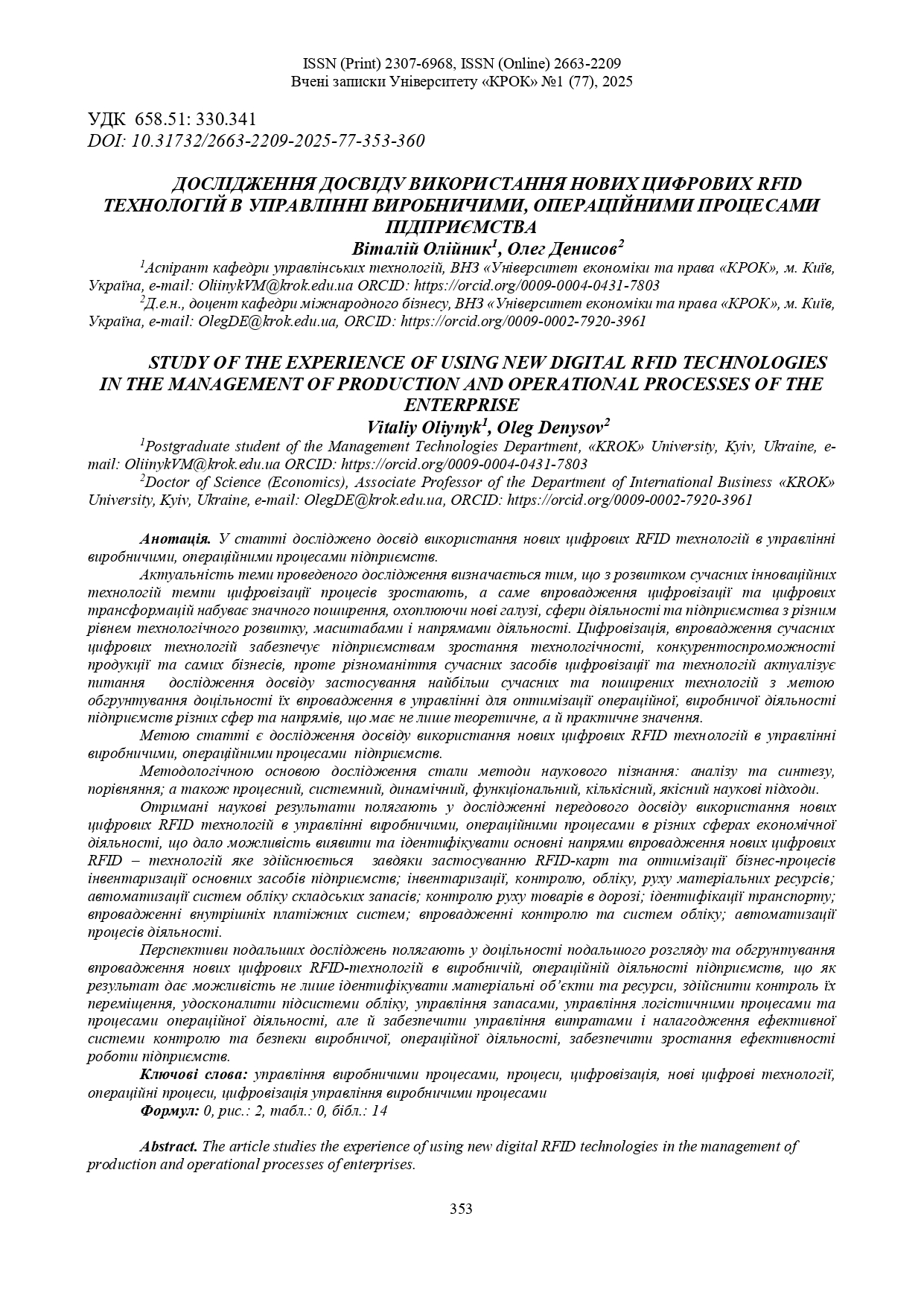ДОСЛІДЖЕННЯ ДОСВІДУ ВИКОРИСТАННЯ НОВИХ ЦИФРОВИХ RFID ТЕХНОЛОГІЙ В УПРАВЛІННІ ВИРОБНИЧИМИ, ОПЕРАЦІЙНИМИ ПРОЦЕСАМИ ПІДПРИЄМСТВА
DOI:
https://doi.org/10.31732/2663-2209-2025-77-353-360Ключові слова:
управління виробничими процесами, процеси, цифровізація, нові цифрові технології, операційні процеси, цифровізація управління виробничими процесамиАнотація
У статті досліджено досвід використання нових цифрових RFID технологій в управлінні виробничими, операційними процесами підприємств.
Актуальність теми проведеного дослідження визначається тим, що з розвитком сучасних інноваційних технологій темпи цифровізації процесів зростають, а саме впровадження цифровізації та цифрових трансформацій набуває значного поширення, охоплюючи нові галузі, сфери діяльності та підприємства з різним рівнем технологічного розвитку, масштабами і напрямами діяльності. Цифровізація, впровадження сучасних цифрових технологій забезпечує підприємствам зростання технологічності, конкурентоспроможності продукції та самих бізнесів, проте різноманіття сучасних засобів цифровізації та технологій актуалізує питання дослідження досвіду застосування найбільш сучасних та поширених технологій з метою обгрунтування доцільності їх впровадження в управлінні для оптимізації операційної, виробничої діяльності підприємств різних сфер та напрямів, що має не лише теоретичне, а й практичне значення.
Метою статті є дослідження досвіду використання нових цифрових RFID технологій в управлінні виробничими, операційними процесами підприємств.
Методологічною основою дослідження стали методи наукового пізнання: аналізу та синтезу, порівняння; а також процесний, системний, динамічний, функціональний, кількісний, якісний наукові підходи.
Отримані наукові результати полягають у дослідженні передового досвіду використання нових цифрових RFID технологій в управлінні виробничими, операційними процесами в різних сферах економічної діяльності, що дало можливість виявити та ідентифікувати основні напрями впровадження нових цифрових RFID – технологій яке здійснюється завдяки застосуванню RFID-карт та оптимізації бізнес-процесів інвентаризації основних засобів підприємств; інвентаризації, контролю, обліку, руху матеріальних ресурсів; автоматизації систем обліку складських запасів; контролю руху товарів в дорозі; ідентифікації транспорту; впровадженні внутрішніх платіжних систем; впровадженні контролю та систем обліку; автоматизації процесів діяльності.
Перспективи подальших досліджень полягають у доцільності подальшого розгляду та обгрунтування впровадження нових цифрових RFID-технологій в виробничій, операційній діяльності підприємств, що як результат дає можливість не лише ідентифікувати матеріальні об’єкти та ресурси, здійснити контроль їх переміщення, удосконалити підсистеми обліку, управління запасами, управління логістичними процесами та процесами операційної діяльності, але й забезпечити управління витратами і налагодження ефективної системи контролю та безпеки виробничої, операційної діяльності, забезпечити зростання ефективності роботи підприємств.
Завантаження
Посилання
Gerbert van den Berg & Paul Pietersma (2015). Key Management Models. The 75+ models every manager needs to know. Pearson. 326 p.
Gong C. & Ribiere V. (2021). Developing a unified definition of digital transformation. Technovation. vol. 102, 102217. DOI: https://doi.org/10.1016/j.technovation.2020.102217
Statista, (2022). RFID adoption in retail 2018-2020, by macro-region. www.statista.com/statistics/1192510/rfid-adoption-in-retail-by-macro-region/
АППАУ (2023). ТОП-4 компанії в Україні з кейсами по RFID. https://appau.org.ua/market-analytics/top-4-kompaniyi-v-ukrayini-z-kejsamy-po-rfid/
Давиденко, Г. В. (2019). Європейський досвід застосування стандартів та їх вплив на міжнародну торгівлю. Бізнес Інформ. №2. C. 53–57.
Державна Служба статистики України (2025). https://www.ukrstat.gov.ua/
Кашканов, В. А. & Кужель, В. П. (2020). Інформаційні системи і технології на автомобільному транспорті. Вінниця: ВНТУ. 104 с.
Коробка, С. В. (2021). Теоретичні аспекти управління виробничими системами в сучасних умовах. Економіка та управління підприємствами. № 1 (03). С. 39-45. http://e-visnyk.dniprondise.in.ua/journals/3_2021/7.pdf
Павленко, П. М., Філоненко, С. Ф. & Бабіч, К. С. (2013). Інформаційні системи і технології. К. : НАУ. 324 с.
Павлов, В.І. & Акімова, Л. М. (2013). Формування системи ідентифікації товарів в Україні. Рівне: НУВГП. 178 с.
Смарт-карти України (2025). Проєкти рішень на основі RFID. https://idcard.com.ua/ua/solutions/
Лазебник, Л.Л. & Войтенко, В.О. (2020). Інформаційна інфраструктура в цифровізації бізнес-процесів підприємства. Науковий вісник Міжнародного гуманітарного університету. № 42. С. 18–22. URL: http://www.vestnik-econom.mgu.od.ua/journal/2020/42-2020/5.pdf
Федулова, Л. (2020). Тенденції розвитку та впровадження цифрових технологій для реалізації цілей сталого розвитку. Економіка природокористування і сталий розвиток. № 7(26). С. 6–14. URL: http://dspace.nbuv.gov.ua/handle/123456789/166840
Фабричев, В. А. & Боровик, В. М (2008). Інформаційні системи і технології підприємства. К.: НАУ. 100 с.

Downloads
Опубліковано
Як цитувати
Номер
Розділ
Ліцензія

Ця робота ліцензується відповідно до Creative Commons Attribution-NonCommercial 4.0 International License.

